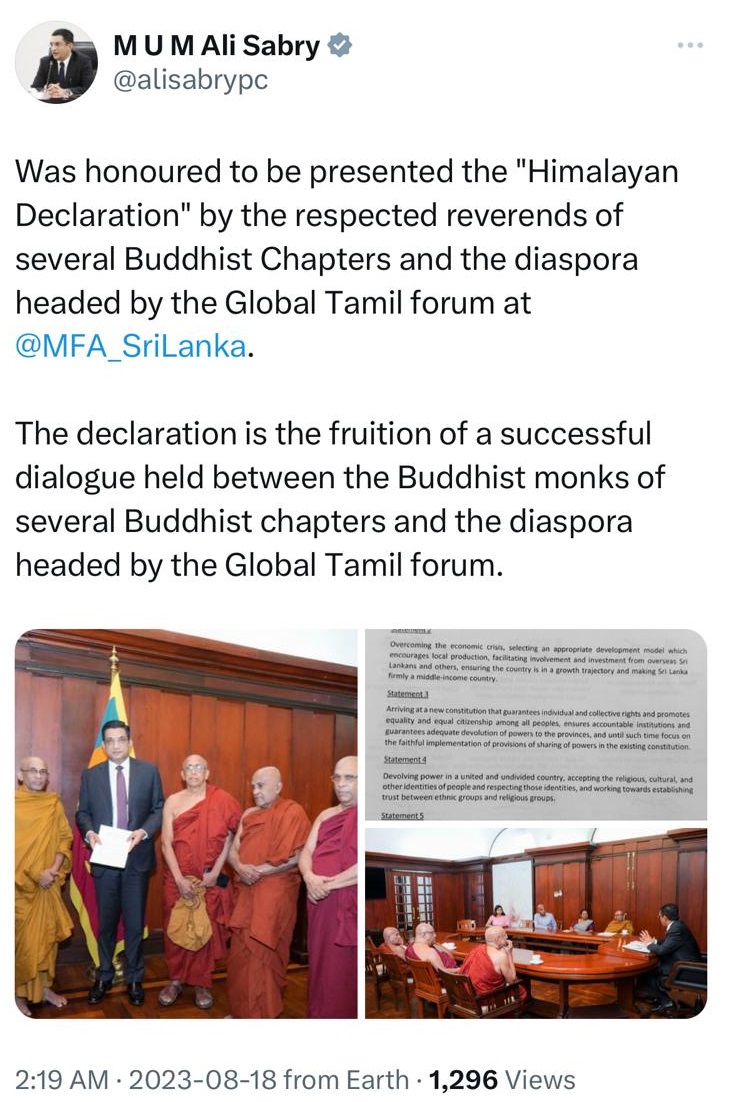.jpg)
The Global Tamil Forum (GTF) met with Ranil Wickremesinghe this week after it signed a declaration with a group of senior Sinhala Buddhist monks from different sects in Sri Lanka.
Photographs published on the Sri Lankan president’s official website show GTF members alongside saffron-robed monks, handing over a copy of the ‘Joint Himalayan Declaration’ to Wickremesinghe.
The GTF was a major Tamil diaspora umbrella organisation at its formation in 2009, however its membership now consists of only the Canadian Tamil Congress (CTC) and Norwegian Tamil Forum (NTF), as well as individual members.
The declaration is a series of six brief statements, that call for “a Sri Lanka where every individual can live peacefully with dignity, trust, and no fear or suspicion, enjoying equal rights”.
The statements speak of a “new constitution that guarantees individual and collective rights”, “devolving power in a united and undivided country” and “a Sri Lanka that is reconciled and committed to learning from its past and creating measures including accountability to ensure that such suffering never occur again”.
It comes after the GTF had taken part in several meetings with the Sinhala Buddhist clergy over recent months.
.jpeg)
.jpeg)
“The preliminary structured engagement in Nagarkot (Nepal) in April 2023 helped us see each other’s point of view,” read a joint statement from the GTF and Sangha for Better Sri Lanka. Photographs from the meetings show GTF members dressed in white sit across from several monks, whilst a senior clergyman heads the room.
The statement went on to say there were “serious negative perceptions among the Tamil people about Buddhist monks”, as well as a “perception” amongst the Sinhala community that the “economically successful and influential Tamil Diaspora is bent on destroying Sri Lanka”.
“One may find that these differing perceptions and fears are not always rationally based,” it continues. “The ‘Himalaya Declaration’ arrived at Nagarkot is an important outcome of our journey together.”
.jpeg)
.jpeg)
Also present at the handing over was Sri Lanka’s Foreign Secretary, Ali Sabry, who tweeted his presence at the meeting, alongside photographs with the Buddhist clergy.
He has since deleted the tweet. Sabry has previously denied that Sri Lanka had committed a genocide against the Tamils and went on to claim that “some terrorists have found safe haven in Canada”.

See the full text of the 'Himalaya Declaration' here and the press release from the GTF and Sinhala Buddhist clergy here.
Both declaration and the joint statement, fail to clarify on any of these six agreed points or practical steps towards them.
Accountability for mass atrocities, for example, has been long sought by Tamil survivors of Sri Lanka’s genocide. Whilst for years Tamils and diaspora organisations around the world, including the GTF, called for an international accountability mechanism, multiple Sri Lankan governments have refused.
Sri Lanka’s president Wickremesinghe, who the GTF handed the joint declaration to this week, has repeatedly stated his fervent opposition to any form of international accountability – including in a fiery DW interview earlier this year.
Read more:
Sri Lanka’s President lashes out when questioned on Channel 4 report
Transcript of Ranil's car crash interview on accountability for Easter bombings
The GTF was formed in 2009, in the aftermath of the Mullivaikkal genocide.
Its launch event in 2010 saw a host of high level speakers from across 14 countries, including the then-British Foreign Secretary David Milliband, Conservative Shadow Foreign Secretary William Hague and Liberal Democrats Shadow Foreign Secretary Ed Davey.
A resolution passed by GTF at the event called on “the international community, governments, leaders and the UN to conduct a UN monitored referendum in the North-East region of Sri Lanka and among the displaced Tamils living in other countries, to determine if they wish independence or to be part of a united Sri Lanka”.
Since then however, several organisations have now left the GTF, which consists of only the Canadian Tamil Congress (CTC) and Norwegian Tamil Forum (NTF), as well as other individual members.
The Sri Lankan government had proscribed dozens of Tamil diaspora organisations and hundreds of individuals under a terrorist designation law, but last year the GTF and CTC were removed from the listing.
Other major diaspora organisations such as the Tamil Youth Organisation (TYO) which has branches across the globe, the National Council of Canadian Tamils (NCCT) and the Transnational Government of Tamil Eelam (TGTE) remain listed. For years various Sri Lankan regimes have proscribed a range of Tamil diaspora groups and individuals. A ban could make it a criminal offence for Sri Lankan citizens to maintain contact with these organisations or their members and stifles links between these groups and individuals on the island.
All of the still active Tamil groups continue to function openly and legally in states across the world, including the USA, UK and throughout Europe. However, in Sri Lanka, they remain barred.
Read more: Selfish and cynical – Sri Lanka lifts ban on some Tamils but many more remain barred
The meeting comes just days after the Sri Lankan security forces launched a crackdown on those attempting to commemorate Maaveerar Naal in the North-East, detaining Tamils under much criticised anti-terrorism legislation.
We need your support
Sri Lanka is one of the most dangerous places in the world to be a journalist. Tamil journalists are particularly at threat, with at least 41 media workers known to have been killed by the Sri Lankan state or its paramilitaries during and after the armed conflict.
Despite the risks, our team on the ground remain committed to providing detailed and accurate reporting of developments in the Tamil homeland, across the island and around the world, as well as providing expert analysis and insight from the Tamil point of view
We need your support in keeping our journalism going. Support our work today.
For more ways to donate visit https://donate.tamilguardian.com.

.jfif)
.jfif)
